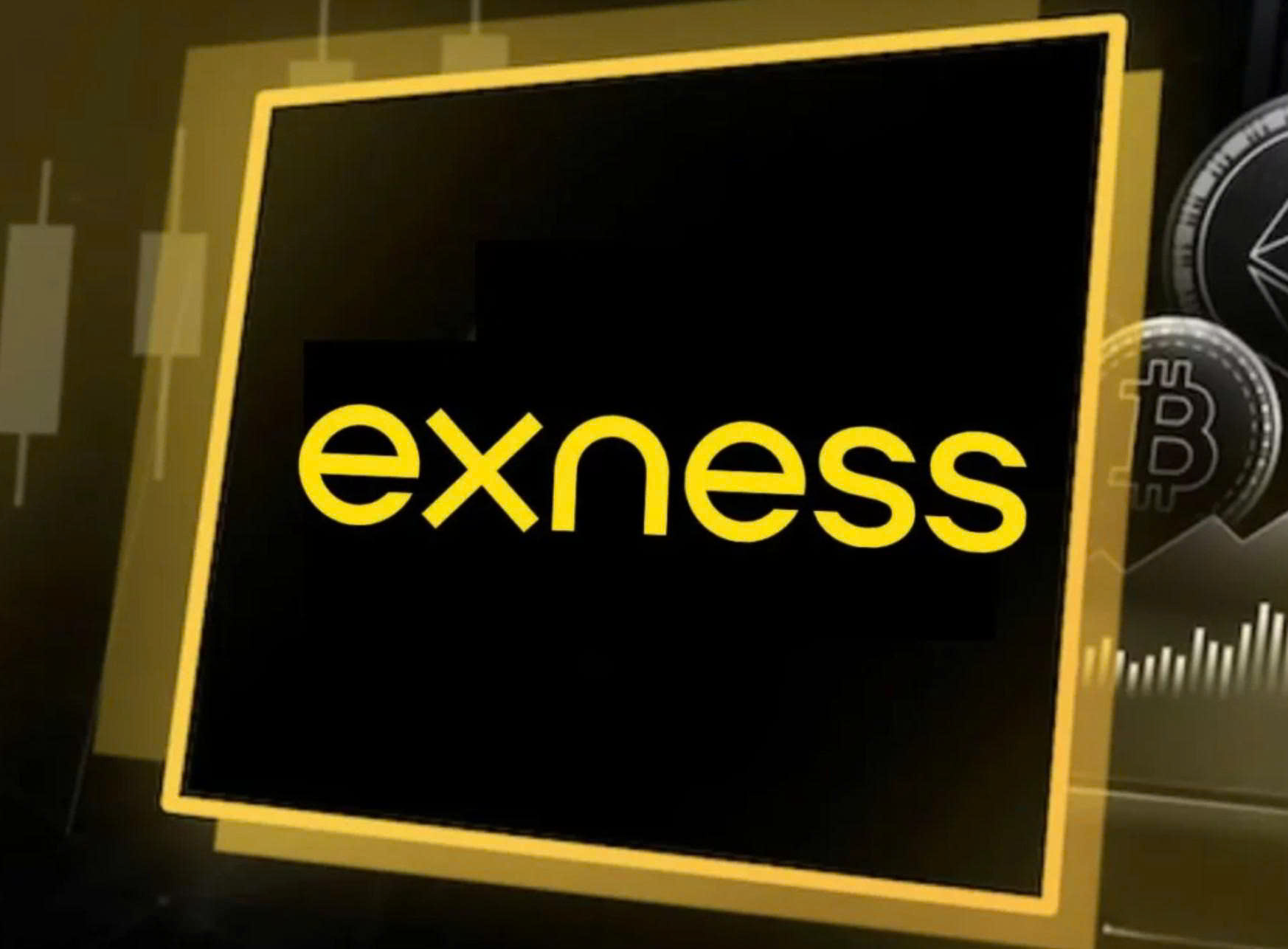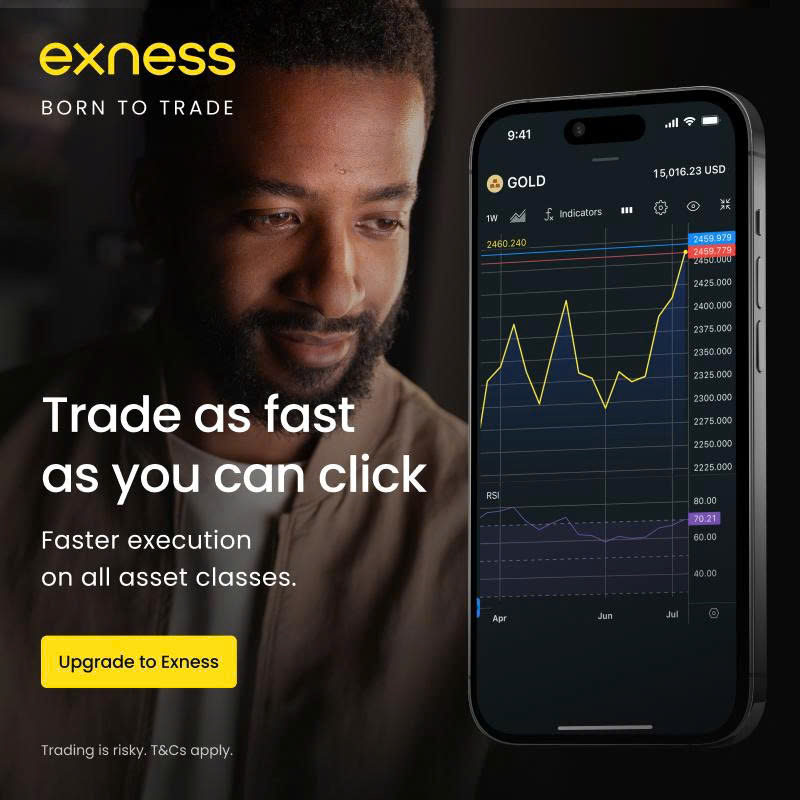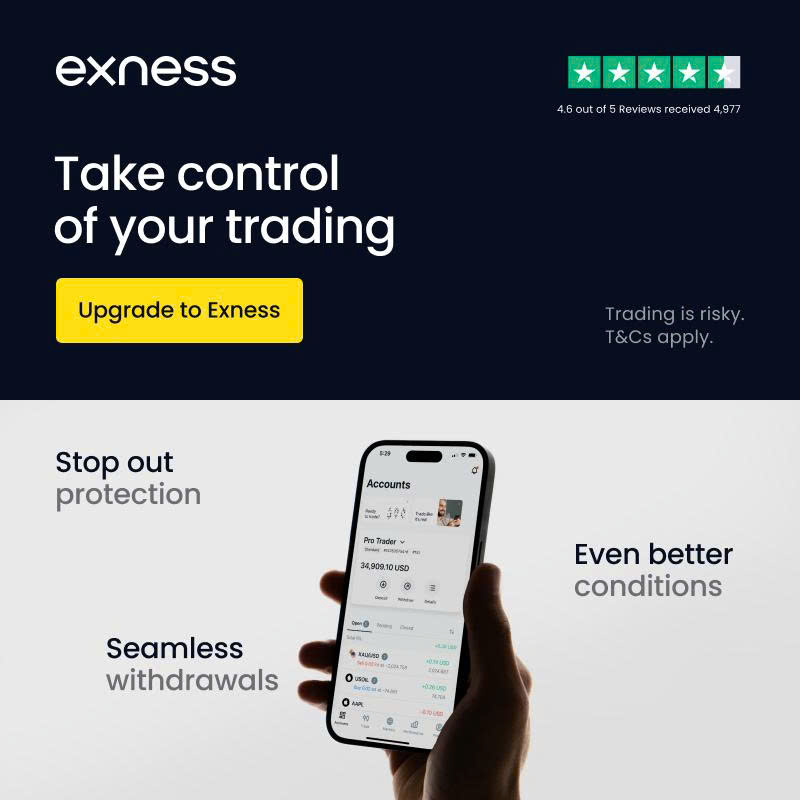
9 minute read
Is Exness a ECN Broker? A Comprehensive Analysis for Traders
from Exness ECN
In the dynamic world of forex trading, selecting the right broker is a critical decision that can significantly impact your trading success. One of the most debated topics among traders is whether a broker operates as an Electronic Communication Network (ECN) broker. Exness, a globally recognized forex and CFD broker, is often at the center of this discussion. The question, "Is Exness a ECN broker?" frequently arises among traders seeking transparency, low spreads, and direct market access. In this in-depth guide, we’ll explore what defines an ECN broker, analyze Exness’s operational model, evaluate its offerings, and help you determine if it aligns with your trading goals. Whether you’re a beginner or a seasoned trader, this article will provide clarity on Exness’s status in 2025.

✅ Join Exness now! Open An Account or Visit Brokers 👈
What is an ECN Broker?
Before diving into Exness’s specifics, let’s clarify what an ECN broker is. An Electronic Communication Network (ECN) broker facilitates direct trading between market participants, such as banks, financial institutions, hedge funds, and individual traders, through an electronic network. Unlike traditional market makers, who may take the opposite side of a client’s trade, ECN brokers act as intermediaries, connecting traders to a network of liquidity providers. This model ensures orders are executed at the best available market prices, offering several key characteristics:
· Direct Market Access: Orders are routed directly to the interbank market, bypassing intermediaries.
· Variable Spreads: Spreads fluctuate based on market conditions, often tightening during high liquidity and widening during volatility.
· Transparency: Traders gain real-time visibility into bid and ask prices from multiple liquidity providers, minimizing hidden fees or markups.
· No Conflict of Interest: ECN brokers earn commissions rather than profiting from client losses, eliminating conflicts of interest.
· Fast Execution: Trades are processed instantly, reducing slippage, which is ideal for scalpers and high-frequency traders.
These features make ECN brokers a preferred choice for professional traders who prioritize speed, transparency, and cost efficiency. However, not all brokers advertising "ECN-like" features operate as pure ECN brokers, as some employ hybrid models combining elements of ECN and market-making systems. So, where does Exness stand?
Exness: A Brief Overview
Founded in 2008 and headquartered in Limassol, Cyprus, Exness has grown into a powerhouse in the forex and CFD trading industry, serving over 1 million active traders worldwide with a monthly trading volume exceeding $4.8 trillion as of early 2025. Regulated by multiple reputable authorities, including the Cyprus Securities and Exchange Commission (CySEC), the UK’s Financial Conduct Authority (FCA), the Financial Services Commission (FSC) in the British Virgin Islands, and the Financial Services Authority (FSA) in Seychelles, Exness has built a strong reputation for reliability, competitive spreads, and innovative technology.
Exness offers a variety of account types—Standard, Standard Cent, Pro, Raw Spread, and Zero—alongside popular trading platforms like MetaTrader 4 (MT4), MetaTrader 5 (MT5), and its proprietary Exness Terminal. With features like instant withdrawals (over 98% processed in under a minute), flexible leverage (up to 1:Unlimited in some regions), and a wide range of tradable instruments (forex, commodities, indices, cryptocurrencies, and stocks), Exness caters to both novice and experienced traders. But does its execution model align with the characteristics of a true ECN broker?
Exness’s Execution Model: ECN, Market Maker, or Hybrid?
Exness doesn’t explicitly label itself as a "pure ECN broker." Instead, it operates a hybrid execution model, blending elements of both ECN and market-making structures. This approach allows Exness to cater to a diverse clientele, from beginners seeking simplicity to professional traders requiring advanced execution. The hybrid model adjusts execution based on the account type, which complicates the classification of Exness as a pure ECN broker. To determine its status, let’s examine its account types and execution policies.
Exness Account Types and Execution
Exness offers several account types, each tailored to different trading needs. The execution method varies depending on the account, which is key to understanding whether Exness operates as an ECN broker:
· Standard and Standard Cent Accounts:
· Execution Type: Market execution.
· Characteristics: These accounts are designed for beginners and casual traders. Orders are processed internally or through Exness’s liquidity pool, with competitive but not raw spreads and no commissions. This setup leans toward a market-maker model, where Exness may act as the counterparty to trades, meaning it does not provide direct market access typical of ECN brokers.
· Suitability: Ideal for novice traders or those trading smaller volumes, but not aligned with ECN principles.
· Pro Account:
· Execution Type: Instant or market execution, depending on the instrument.
· Characteristics: Aimed at experienced traders, the Pro account offers low spreads and no commissions in some cases. While it provides faster execution and competitive pricing, it may still involve some market-maker elements, as not all orders are routed directly to the interbank market.
· Suitability: Suitable for traders seeking a balance between cost and execution speed, but not a pure ECN experience.
· Raw Spread Account:
· Execution Type: Market execution with ECN-like conditions.
· Characteristics: This account offers raw market spreads starting from 0.0 pips, paired with a small commission per lot. Orders are routed to liquidity providers, providing direct market access and mimicking ECN conditions. The tight spreads and transparency align closely with ECN principles.
· Suitability: Ideal for scalpers and high-frequency traders seeking ECN-like features.
· Zero Account:
· Execution Type: Market execution with ECN-like conditions.
· Characteristics: Features zero spreads on major forex pairs for most of the trading day, with a per-lot commission. Like the Raw Spread account, it connects traders to liquidity providers, offering raw market pricing and fast execution, closely resembling a true ECN model.
· Suitability: Perfect for professional traders prioritizing minimal spreads and direct market access.
Hybrid Model Explained
Exness’s hybrid model means it operates as a market maker for some accounts (Standard and Standard Cent) and provides ECN-like conditions for others (Raw Spread and Zero). In the Raw Spread and Zero accounts, Exness connects traders to a network of liquidity providers, ensuring tight spreads, fast execution, and transparency—hallmarks of ECN trading. However, because it also offers market-maker accounts, Exness cannot be classified as a "pure" ECN broker. Instead, it provides ECN-like conditions through its professional accounts, making it a versatile option for traders with varying needs.

✅ Join Exness now! Open An Account or Visit Brokers 👈
Comparing Exness to Pure ECN Brokers
To assess whether Exness qualifies as an ECN broker, let’s compare its features to those of a pure ECN broker:
· Direct Market Access: Pure ECN brokers route all orders to the interbank market. Exness does this for its Raw Spread and Zero accounts but not for Standard accounts, which rely on internal liquidity pools.
· Spreads and Commissions: Pure ECN brokers offer raw spreads (often starting at 0.0 pips) with commissions. Exness’s Raw Spread and Zero accounts align with this model, while Standard accounts have wider spreads and no commissions, typical of market makers.
· Transparency: ECN brokers provide real-time market depth and order book visibility. Exness offers transparency in its professional accounts, with access to raw pricing and minimal markups.
· No Conflict of Interest: ECN brokers earn through commissions, not client losses. Exness avoids conflicts in its Raw Spread and Zero accounts, as it doesn’t take the opposite side of trades, but this may not apply to Standard accounts.
· Execution Speed: ECN brokers prioritize fast execution to minimize slippage. Exness boasts a slippage rate of less than 1% (data from September 2024 to January 2025), with orders executed in milliseconds, rivaling pure ECN brokers.
While Exness’s professional accounts (Raw Spread and Zero) closely resemble the ECN model, its Standard accounts lean toward a market-maker structure. This hybrid approach distinguishes Exness from pure ECN brokers, which exclusively offer direct market access across all account types.
Advantages of Trading with Exness’s ECN-Like Accounts
For traders considering Exness’s Raw Spread or Zero accounts, the ECN-like features offer several benefits:
· Tighter Spreads: Spreads starting from 0.0 pips on major pairs reduce trading costs, especially for high-frequency traders.
· Fast Execution: Orders are executed in milliseconds, minimizing slippage and supporting strategies like scalping and day trading.
· Transparency: Access to raw market pricing and liquidity provider quotes ensures fair trading conditions.
· No Conflict of Interest: Exness earns commissions on professional accounts, aligning its interests with those of its clients.
· Deep Liquidity: Exness connects to multiple Tier 1 liquidity providers, ensuring robust order execution even during volatile market conditions.
Additionally, Exness enhances its appeal with features like instant withdrawals, no deposit or withdrawal fees (though payment providers may charge), and free VPS hosting for algorithmic traders. Its regulatory compliance with top-tier authorities like CySEC and FCA further ensures a secure trading environment.
Potential Drawbacks
While Exness’s ECN-like accounts are compelling, there are some considerations:
· Commissions: The Raw Spread and Zero accounts charge commissions, which may increase costs for high-volume traders compared to commission-free Standard accounts.
· Not Pure ECN: Traders seeking a pure ECN experience may find the hybrid model less appealing, as Standard accounts operate under a market-maker framework.
· Account Selection: Beginners may find the variety of account types confusing, and choosing a non-ECN account could limit access to direct market conditions.
Is Exness the Right Choice for You?
Whether Exness is the right broker depends on your trading style, experience level, and priorities:
· For Scalpers and High-Frequency Traders: The Raw Spread and Zero accounts are excellent choices, offering ECN-like conditions with tight spreads, fast execution, and transparency.
· For Beginners: The Standard or Standard Cent accounts provide a user-friendly, commission-free experience, though they lack direct market access.
· For Professional Traders: The Pro, Raw Spread, and Zero accounts cater to advanced strategies, with ECN-like features and access to sophisticated tools like MT4, MT5, and Trading Central.
Conclusion
Exness is not a pure ECN broker but operates a hybrid model that combines ECN and market-maker elements. Its Raw Spread vs Zero accounts provide ECN-like conditions, including direct market access, raw spreads, and fast execution, making them ideal for professional traders. However, its Standard accounts lean toward a market-maker model, catering to beginners and casual traders. With its robust regulation, innovative features, and competitive pricing, Exness remains a versatile and reliable choice for traders worldwide.
If you prioritize transparency, low spreads, and fast execution, Exness’s professional accounts deliver a near-ECN experience that rivals pure ECN brokers. For traders seeking flexibility and a balance of cost and performance, Exness’s hybrid model is a compelling option. To explore Exness’s offerings, visit their official website and choose the account type that best suits your trading goals.
✅ Join Exness now! Open An Account or Visit Brokers 👈
Read more:

